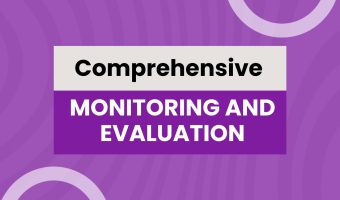Comprehensive Monitoring and Evaluation
About This Course
This 26-week Comprehensive Monitoring and Evaluation (M&E) Program provides professionals with the tools and knowledge to systematically assess development programs, design results-based M&E systems, and promote evidence-informed decision-making. It progresses from foundational concepts through intermediate tools to advanced application of evaluation designs and data use.
Learning Objectives
Understand the foundational principles and roles of Monitoring and Evaluation (M&E) within the project and program management cycle.
Design M&E systems and frameworks, including Logical Frameworks (LogFrames), Theories of Change (ToC), and M&E plans.
Develop and apply SMART indicators and KPIs to measure inputs, outputs, outcomes, and impacts.
Collect, manage, and analyze data using both qualitative and quantitative methods while ensuring data quality and ethical standards.
Use data collection tools and software such as KoboToolbox, Excel, and SPSS for survey design and analysis.
Interpret and report M&E findings through dashboards, performance reports, and data visualizations.
Conduct performance measurement and program evaluations using appropriate tools and methodologies.
Communicate M&E results effectively to stakeholders to support decision-making, learning, and accountability.
Design and present a full M&E system or evaluation plan for a real or simulated project as part of the capstone project.
Target Audience
- M&E professionals, project managers, development practitioners, researchers, and data analysts
Curriculum
78h
Module 1: Introduction to Monitoring and Evaluation
This module lays the foundation of M&E principles, terms, and practices. Participants will explore the role of M&E in project management and learn to differentiate between monitoring, evaluation, and related functions.
Topics Covered:
- Overview and Purpose of M&E
- M&E within the Project Cycle
- Key Concepts: Inputs, Outputs, Outcomes, Impact
- Types and Levels of M&E
- M&E Stakeholders and Roles
- Ethical and Cultural Considerations in M&E
- Introduction to M&E Frameworks
Module 2: Developing M&E Frameworks and Tools
This module focuses on results frameworks, logical frameworks (LogFrames), and theories of change. Participants will learn how to design robust M&E systems aligned with program objectives.
Topics Covered:
- Results-Based Management (RBM)
- Developing Logical Frameworks (LogFrames)
- Theory of Change (ToC)
- M&E Plans: Structure and Components
- Indicator Development
- Baseline and Target Setting
- Data Quality Assurance (DQA) Mechanisms
Module 3: Data Collection Methods and Tools
Participants will explore data collection strategies for M&E, including qualitative and quantitative methods. Tools will include survey instruments, focus groups, key informant interviews, and participatory techniques.
Topics Covered:
- Data Sources and Data Collection Methods
- Survey Design and Sampling Techniques
- Focus Group Discussions (FGDs) and Key Informant Interviews
- Observation and Participatory Tools
- Use of Mobile and Digital Tools
- Ethics in Data Collection
- Developing and Piloting Tools
Module 4: Data Management and Analysis
This module teaches data entry, cleaning, storage, and analysis using tools such as Excel, SPSS, KoboToolbox, and Google Sheets. Participants will explore data visualization techniques and interpretation methods.
Topics Covered:
- Data Cleaning and Entry Techniques
- Quantitative Analysis
- Qualitative Data Coding and Thematic Analysis
- Data Visualization
- Using Excel and SPSS
- Data Quality Management
- Reporting and Storytelling with Data
Module 5: Designing and Conducting Evaluations
Participants will learn how to design, implement, and manage evaluations. The module covers evaluation types, methodologies, and reporting standards.
Topics Covered:
- Types of Evaluation
- Evaluation Planning and Terms of Reference (ToR)
- Evaluation Designs
- Mixed Methods in Evaluation
- Sampling and Validity in Evaluations
- Report Writing and Presentation of Findings
- Evaluation Ethics and Independence
Module 6: Performance Measurement and Use of M&E Data
This module strengthens the capacity to track program performance using Key Performance Indicators (KPIs), dashboards, and data utilization for decision-making.
Topics Covered:
- Performance Indicators and KPIs
- Performance Target Setting
- Dashboards for Decision-making
- Linking M&E to Strategic Planning and Budgeting
- M&E for Learning and Accountability
- Knowledge Management
- Communicating Results to Stakeholders
Module 7: Institutionalizing M&E Systems
Participants will understand how to institutionalize M&E within an organization. Focus will be on M&E capacity building, integration into policies, and sustainability.
Topics Covered:
- M&E Institutional Frameworks
- National and Sectoral M&E Systems
- Organizational Capacity for M&E
- Human Resource Planning for M&E Units
- Integrating M&E into Program and Policy Cycles
- Advocacy and Resource Mobilization
- M&E Sustainability Planning
Module 8: Reporting, Communication, and Use of M&E Findings
Participants will learn how to write an M&E report, present findings to stakeholders, and use M&E data to inform decision making and continuous improvement.
- Writing M&E reports
- Policy briefs and executive summaries
- Presenting results to stakeholders
- Promoting the utilization of evaluation findings
Module 9: Capstone Project and Presentation
This final module is dedicated to a hands-on capstone project where participants design a comprehensive M&E system or conduct a mini-evaluation and present their results.
Topics Covered:
- Development of M&E Framework or Evaluation Plan
- Data Collection Tool Design
- Analysis and Visualization
- Final Report and Presentation to a Panel
- Peer and Instructor Feedback





